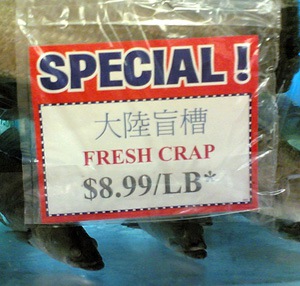 For those looking for the perfect storm of formerly-catchy, all-that buzzwords in order to live la vida loca, this post is for you. Not only has the vernacular surrounding social media become totally square, and the-opposite-of-phat, but the vast majority of people using these once-fly words have no idea they are now totally lame.
For those looking for the perfect storm of formerly-catchy, all-that buzzwords in order to live la vida loca, this post is for you. Not only has the vernacular surrounding social media become totally square, and the-opposite-of-phat, but the vast majority of people using these once-fly words have no idea they are now totally lame.
Here is a quick rundown of words that should be removed from the suburban dictionary, stat:
1. User-Generated-Content
Latin for “crap,” user-generated-content (or UGC) is the buzzword used to describe anything published online by Average Joe. The problem is, most Average Joes who are posting content are also spending their weekends building bombs in their basements.
UGC is a fancy name used to make an unregulated, uneducated slew of junk sound like it’s sophisticated and profound (well beyond its qualifications). While it worked to hide the truth in the beginning, everyone who uses social media has since gotten wise, and UGC is now as overused and groan-worthy as a Gary Coleman joke.
2. Optimization
Offering optimization is a nice way of saying, “Hey, we’re gonna make your thing better at being a thing. We’re not sure how, but probably through optimizing it.” Most people can smell the BS from a mile away.
Whether it is keyword optimization, social media optimization, mobile optimization, or optimal optimization, the only real value the word “optimization” has is in a game of Scrabble. (63 points, not counting any double or triple word scores).
 3. Monetize
3. Monetize
The word “monetize,” a verb, refers to the process of enforcing a mythological state of being to something that has little or no value. “Monetize” is a fancy way of describing intentions to make something valuable, without ever outlining the process through which value will be instilled.
This means claiming to be able to make money off of something’s popularity, based on no factual evidence. While a few Internet ideas have been successfully monetized (Facebook, Google, AOL), the majority of them (Bob’s Fishing Blog) have not.
4. Authenticity
Authenticity is a buzzword that has been overused across all fields, mostly because it’s a fancy way to say “real.” Creating an “authentic” blog or giving a look of “authenticity” means “we will make this thing look real.”
However, beyond that, there is limited explanation. Just because Pinocchio said he was a real boy, does not make it so. Claiming that a product is authentic offers no assurance beyond stating that it will physically exist in time or space.
5. Green
Unfortunately, “green” is not a unit of measure. There is no established set of prerequisites that must be met before declaring one has “gone green.” Because of its popularity and fuzzy definition, everyone who’s anyone is going green.
Got that Hummer up to 12 MPG highway? Congrats on going green! Limited your amount of annual carbon emissions down to only two trillion tons? Congrats on going green! Posted a sign that reads, “Please turn off light in break room?” Congrats on going green! Because “going green” is a completely unregulated state of being, it has become a completely overused and annoying buzzword.
6. Synergy
Synergy, by definition, is “Combining two or more elements in order to obtain a more desirable result than any individual element could produce on its own.” Synergy is simply a way of stating something is different.
There has always been peanut butter, and there has always been jelly; putting them together is an example of synergy. In reality, synergy is usually a fancy way of covering up for the fact that if peanut butter and jelly sit in a paper bag for too long, the bread will become soggy and the peanut oil will rise to the top.
7. Social Networking
Thank Aaron Sorkin for this one; “Social Networking” has become the copyright-infringement-free way of saying “Facebooking.”
Much as facial tissues are to Kleenex, or inline skates are to Rollerblades, so is social networking to Facebooking (or Twittering, or the act of spending time on any other website instead of working). While we do not expect these sites to disappear anytime soon, we surely hope that their aliases will.
Conclusion
Buzzwords are a double-edged sword, as part of the reason we hate them is because of how much we once loved them. A buzzword is usually a clever way of expressing an idea, which, once expressed, immediately loses shine with each additional use.
While there is no way of preventing new buzzwords from popping up, it is up to us to retire the old ones. And, we think that is perfectly Fazmazzle.
Post images by: by aussiegall and Plutor

